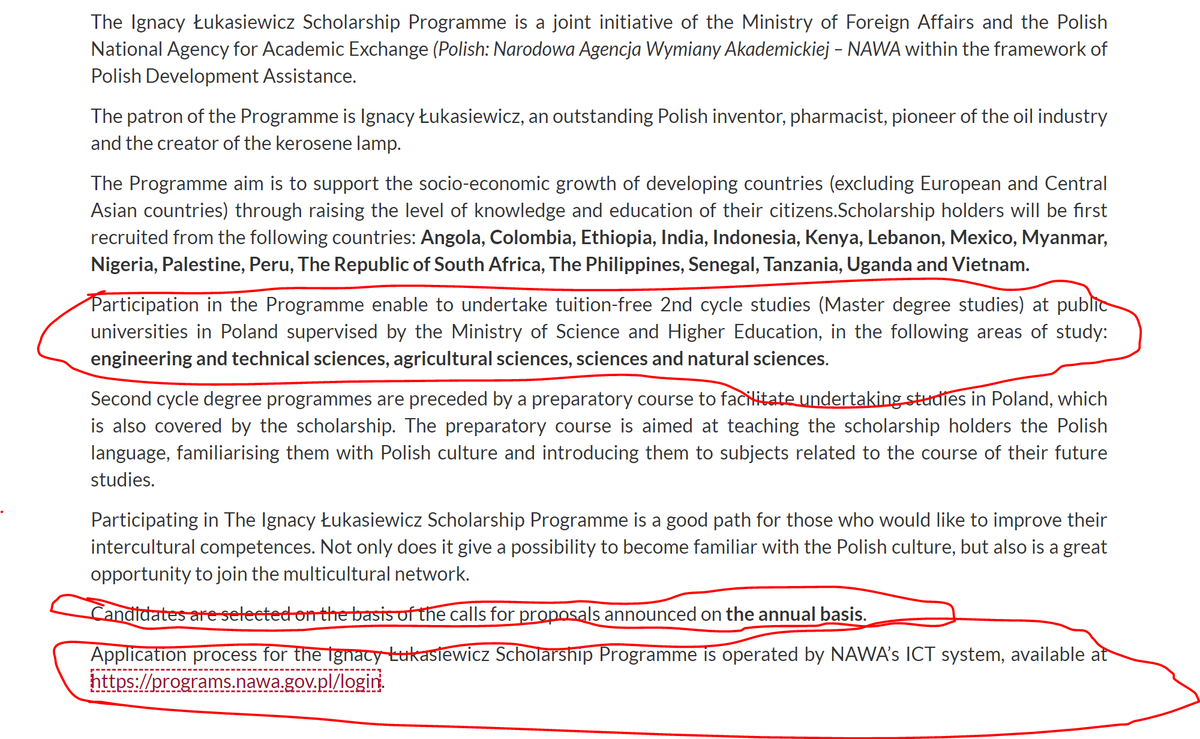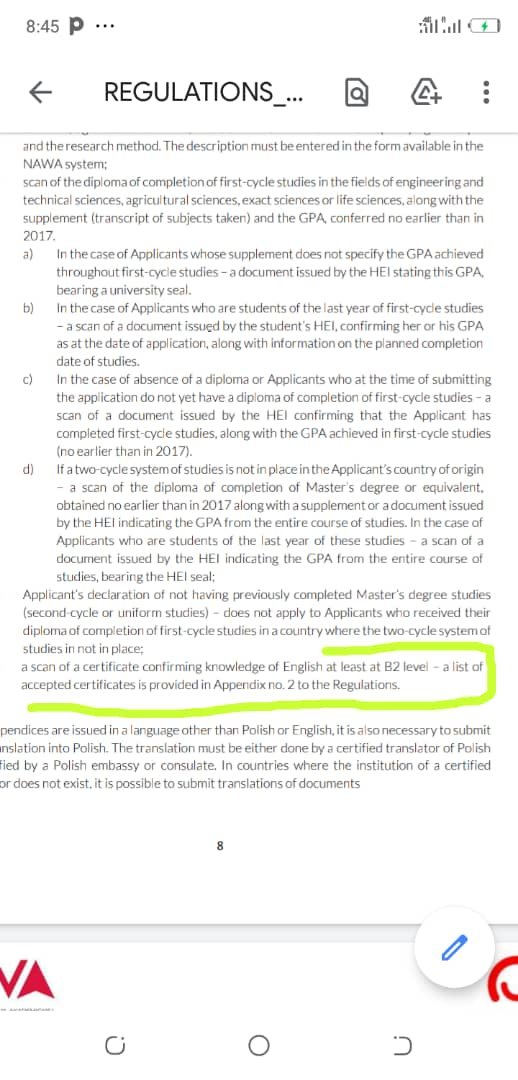
Admission and Scholarship in Poland (Part A)
We are here again, as usual🧵.
Tag all your friends who love Poland.
To know everything about Poland, you need to thoroughly check with this website: go-poland.pl
We are here again, as usual🧵.
Tag all your friends who love Poland.
To know everything about Poland, you need to thoroughly check with this website: go-poland.pl
It contains all available scholarships, schools, News and why Poland is a nice place to study and live.
The list of all available scholarships can be found below: go-poland.pl/scholarships
The list of all available scholarships can be found below: go-poland.pl/scholarships

If you click 'Scholarships for citizens from developing countries', as shown above, you will see the list of all available scholarships for your region.
The First Scholarship you will see is 'The Ignacy Łukasiewicz Scholarship Programme', known as NAWA.
The First Scholarship you will see is 'The Ignacy Łukasiewicz Scholarship Programme', known as NAWA.

The countries eligible are shown above.
Scroll down the page to see: nawa.gov.pl/en/ where you will have the full information about this scholarship.
From there, click, 'students' as shown below to see exactly what the scholarship program looks like.
Scroll down the page to see: nawa.gov.pl/en/ where you will have the full information about this scholarship.
From there, click, 'students' as shown below to see exactly what the scholarship program looks like.

The NAWA program is for both Polish and Foreign students as seen from the website.
Scroll down and click on foreign students.
It will take you to this page:nawa.gov.pl/en/students/fo…
Scroll down and click on foreign students.
It will take you to this page:nawa.gov.pl/en/students/fo…
Scroll down again and click on 'The Ignacy Lukasiewicz Scholarship Programme' as shown below:
This is the only scholarship that has developing Nations.
This is the only scholarship that has developing Nations.

Kindly note the following highlighted areas as you click:
Check to see if your course is there, then proceed to click the link to see the Application process.
Click and then create an account.
You can now start filling the form.
Check to see if your course is there, then proceed to click the link to see the Application process.
Click and then create an account.
You can now start filling the form.

As you begin to fill the form, you will see a guide to download.
Let me give you some important info from last year's guide:
1. The Scholarship is specific to a particular year of graduation. Last year, the scholarship required that you graduated from 2017 and above. See here:
Let me give you some important info from last year's guide:
1. The Scholarship is specific to a particular year of graduation. Last year, the scholarship required that you graduated from 2017 and above. See here:

So, read before you start filling.
2. You will be evaluated based on two things:
a.Quality of your Research Proposal (80%)
b. Academic Result (CGPA) (20%)
see:
2. You will be evaluated based on two things:
a.Quality of your Research Proposal (80%)
b. Academic Result (CGPA) (20%)
see:

Last year's cut off mark was 46/50.
So, it's competitive I must say.
4. It's for both Msc and PhD
5. You will be paid about 1,500 Polish złoty for Msc where you can pay about 450/month for feeding and accommodation, and about 150/ 3 months for Transportation.
So, it's competitive I must say.
4. It's for both Msc and PhD
5. You will be paid about 1,500 Polish złoty for Msc where you can pay about 450/month for feeding and accommodation, and about 150/ 3 months for Transportation.
The rest is for you, plus side jobs you can do.
6. You will first be taught the Polish Language for at least a semester before starting your Msc/PhD. Msc is about 1.5-2 years and about 4 years for PhD.
6. You will first be taught the Polish Language for at least a semester before starting your Msc/PhD. Msc is about 1.5-2 years and about 4 years for PhD.
7. You have unlimited hours to work, but it is difficult because you have to update your results monthly to the scholarship body. But if you are self-funded, you can work unlimited hours without fear.
8. You can work unlimited hours during the summer and make enough cash😎
8. You can work unlimited hours during the summer and make enough cash😎
9. Admission timeline is usually Feb. /March and Sept/October every year.
Que: What other ways can I get Scholarship in Poland if I don't merit the one you described above?
Ans: Watch out for Part B🤣😃
Tag your friends whole you take chilled coke to digest the Info.
Que: What other ways can I get Scholarship in Poland if I don't merit the one you described above?
Ans: Watch out for Part B🤣😃
Tag your friends whole you take chilled coke to digest the Info.
Goodluck:
CC: @Dr_Adeleke @drhammed @particular6
@Iam_MrPackagin @arawu_samuel @james_omoboye
@oulawal @bestmanojo @adejimiadeniji @olumuyiwaayo @oguntuyakitimi @SamdGreat01
@matajson @BolaTomiyosi @Ijesha_canadian @Olufemiloye @FclNetwork @AdeleyeSamuelA
CC: @Dr_Adeleke @drhammed @particular6
@Iam_MrPackagin @arawu_samuel @james_omoboye
@oulawal @bestmanojo @adejimiadeniji @olumuyiwaayo @oguntuyakitimi @SamdGreat01
@matajson @BolaTomiyosi @Ijesha_canadian @Olufemiloye @FclNetwork @AdeleyeSamuelA
@yanjus4christ @amuta_ann @MomentsWithBren
@officialgbegbin @Okpala_IU @iam_jibolar
@AaronAkpuPhilip @AnumahABD @eniolakiite @Jamaticulus
@officialgbegbin @Okpala_IU @iam_jibolar
@AaronAkpuPhilip @AnumahABD @eniolakiite @Jamaticulus
• • •
Missing some Tweet in this thread? You can try to
force a refresh




